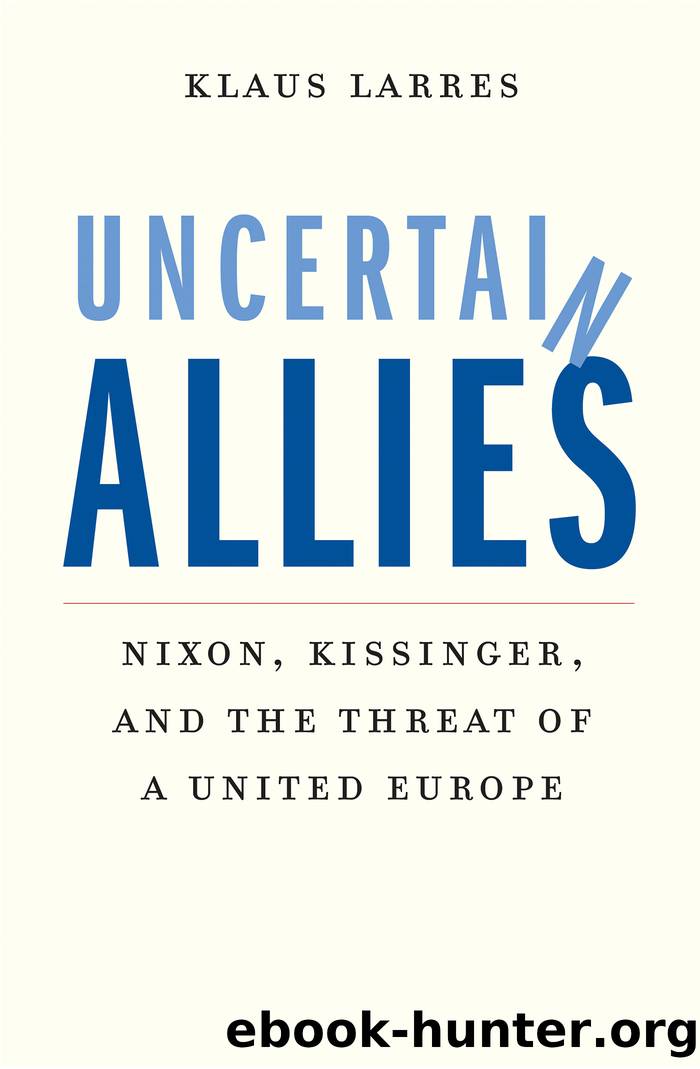Uncertain Allies by Klaus Larres

Author:Klaus Larres
Language: eng
Format: epub
Publisher: Yale University Press
Published: 2021-06-15T00:00:00+00:00
Kissingerâs Speech and the ECâs Response
To the utter surprise of many people, in April 1973, Kissinger grandly announced the Year of Europe to put transatlantic relations on a new footing, though of course still under firm US leadership. In his speech on April 23, 1973, at an Associated Press luncheon in New Yorkâs luxurious Waldorf Astoria Hotel, Kissinger proposed a new comprehensive Atlantic Charter for âsetting the goals for the futureâ and reinvigorating âshared ideals and common purposes.â The new grand charter would be signed by the president, Kissinger announced, during Nixonâs envisaged visit to Europe in the fall.82
Kissinger did not hesitate in his speech to emphasize that the US had global responsibilities, while the EC countries only had to deal with regional problems. He also insisted on a greater degree of military burden sharing, as only Europeâs economic contribution would guarantee the further functioning of the United Statesâ security umbrella.83 Both points but particularly the âquid pro quoâ linkage between economic and security concerns led to severe difficulties with the western Europeans. Kissinger was quite right regarding the provinciality of Europeâs regional concerns, though no one in Europe wished to admit it. His speech, therefore, went down like a lead balloon.84 Kissinger had actually argued along very similar lines in his scholarly writings.85 This, however, had largely been forgotten. Instead, on the old continent, his Year of Europe proposals were received with both alarm and astonishment. Kissinger later defended himself by claiming that he had been misunderstood; he would be glad to see Europe develop into a global player. Yet the damage had been done. Besides, Kissinger did not really believe that the EC would become a global power anytime soon. âThe Europeans are conducting a domestic but not a foreign policy,â he remarked toward the end of the year. âDe Gaulle had a foreign policy,â but Pompidou only âhas an economic policy.â86
Kissinger also maintained that he had not intended to put pressure on Europe by casting doubts about Washingtonâs defense commitment to the continent. In his speech, he indeed emphasized that âAmerica remains committed to doing its fair share in Atlantic defenseâ and that Nixon was âadamantly opposed to unilateral withdrawal of U.S. forces from Europe.â87 The American people, he added, however, had a right to expect a ârational defense posture, at the safest minimum size and cost, with burdens equitably shared.â Kissinger continued by saying that âwhen this is achieved, the necessary American forces will be maintained in Europe.â This indeed sounded like a conditional offer. In not-so-subtle words, he had also stated bluntly, âan unbridled economic competition ⦠can sap the impulse for common defense.â88
At the same time, Kissinger attempted to come across as a strong supporter of the unity of Europe. The transatlantic alliance, he outlined, had âbeen the cornerstone of all postwar foreign policyâ and âthe stimulus for an unprecedented endeavor in European unity.â He even claimed that âno elementâ of US foreign policy had been âmore consistent than our support of European unity,â though Washington âknew that a united Europe would be a more independent partner.
Download
This site does not store any files on its server. We only index and link to content provided by other sites. Please contact the content providers to delete copyright contents if any and email us, we'll remove relevant links or contents immediately.
| Belgium | France |
| Germany | Great Britain |
| Greenland | Italy |
| Netherlands | Romania |
| Scandinavia |
Room 212 by Kate Stewart(4108)
The Crown by Robert Lacey(4108)
Endurance: Shackleton's Incredible Voyage by Alfred Lansing(3845)
The Iron Duke by The Iron Duke(3641)
The Rape of Nanking by Iris Chang(3518)
Killing England by Bill O'Reilly(3457)
Joan of Arc by Mary Gordon(3260)
Say Nothing by Patrick Radden Keefe(3062)
I'll Give You the Sun by Jandy Nelson(2842)
Hitler's Monsters by Eric Kurlander(2734)
Shadow of Night by Deborah Harkness(2720)
Margaret Thatcher: The Autobiography by Thatcher Margaret(2687)
Mary, Queen of Scots, and the Murder of Lord Darnley by Alison Weir(2678)
Darkest Hour by Anthony McCarten(2648)
Blood and Sand by Alex Von Tunzelmann(2610)
Red Famine: Stalin's War on Ukraine by Anne Applebaum(2466)
Eleanor & Park by Rainbow Rowell(2394)
The One Memory of Flora Banks by Emily Barr(2349)
Book of Life by Deborah Harkness(2265)
